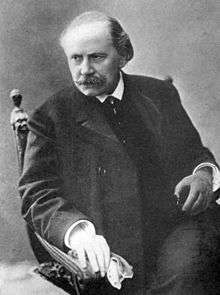Don César de Bazan
| Jules Massenet |
|---|
 |
|
Operas
|
|
Oratorios
|
|
Ballets
|
Don César de Bazan is an opéra comique in four acts by Jules Massenet to a French libretto by Adolphe d'Ennery, Philippe-François Pinel "Dumanoir" and Jules Chantepie, based on the drama Ruy Blas by Victor Hugo. It was first performed at the Opéra-Comique in Paris on 30 November 1872.
It was the first full-length opera by Massenet to be produced, the one-act La grand'tante having been mounted five years earlier by the same company. Don César de Bazan was not a success and it would be another five years, with the premiere of Le roi de Lahore in 1877, before Massenet rose to his place among the most prominent composers of his time.
Don César de Bazan was initially performed 13 times at the Opéra-Comique. After the fire at the Salle Favart when the parts were lost, Massenet constructed a new version from the vocal score, and this was performed in Geneva in 1888, then Antwerp, Brussels, the French provinces and the Gaîté-Lyrique in 1912, and the Hague in 1925.[1] The work contains one piece that is performed separately with any frequency, the Sevillana for coloratura soprano.
A modern revival took place in several French cities in 2016, when the Frivolités Parisiennes staged a new production including an appearance at the Théâtre de la Porte Saint-Martin, conducted by Mathieu Romano.[2]
Roles
| Role | Voice type | Premiere Cast,[3] 30 November 1872 (Conductor: Adolphe Deloffre) |
|---|---|---|
| Maritana | soprano | Marguérite Priola |
| Lazarille, a boy | mezzo-soprano | Célestine Galli-Marié |
| Charles II of Spain | tenor | Paul Lhérie |
| Don César de Bazan | baritone | Jacques Bouhy |
| Don José de Santarém | baritone | Neveu |
| Captain of the guard | bass | François Bernard |
| Men and Women folk, Soldiers, Harquebusiers, Ladies and Gentlemen of the Court | ||
Synopsis
Don César is a poor Spanish grandee who fights a duel to save Lazarille from a cruel captain. Since a royal edict forbids duelling during Holy Week, Don César is arrested and condemned to death by hanging. In his prison cell, he is visited by Don José de Santarém (a minister of the king Charles II) who loves the queen, who in turn refuses his love unless the king is proved to have been unfaithful to her. Charles II is enamoured of Maritana, a street singer, whom he cannot approach because of her low station. Don José therefore plots to have Maritana marry the condemned man before his execution thus making her Countess de Bazan. Without explaining his plan, he promises Maritana riches and status and his friend Don César commutation to death by firing squad and protection for the boy Lazarille. The marriage takes place and then the execution. The widow is escorted to the San Fernando palace to learn courtly manners, being assured that her husband will return from exile soon. But the king comes to visit her, claiming to be Don César - Maritana says she cannot love him. Before Charles II can force his attentions on her, Don César comes in, and it emerges that Lazarille had removed the shot from the muskets. Don César is appointed governor of Granada by the king, and leaves with his beautiful wife.
See also
References
- Notes
- ↑ Irvine D. Massenet: a chronicle of his life and times. Amadeus Press, Portland, 1997.
- ↑ Forumopera.com Le Magazine du monde lyrique accessed 25 September 2016.
- ↑ Casaglia, Gherardo (2005).[http://www.amadeusonline.net/almanacco?r=&alm_giorno=30&alm_mese=11&alm_anno=1872&alm_testo=Don_C%E9sar_de_Bazan "Don César de Bazan, 30 November 1872"]. Almanacco Amadeus (Italian).
External links
- Don César de Bazan: Scores at the International Music Score Library Project